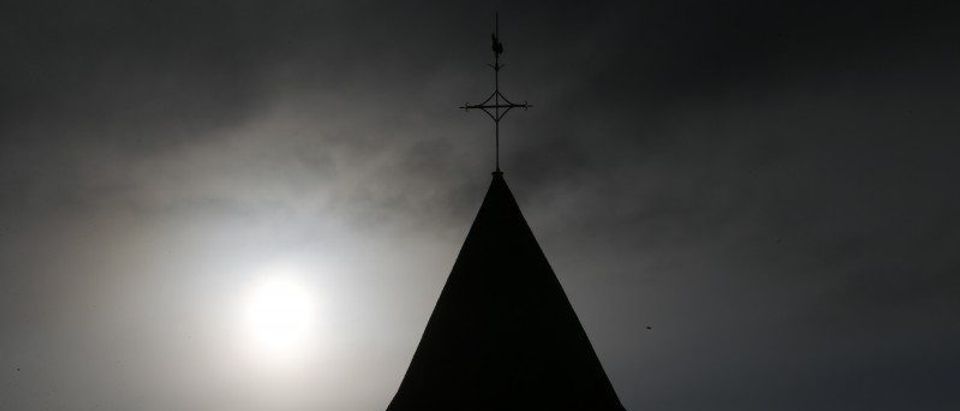It is painful to stand by helplessly as people you deeply care for make decisions that place their good character on the path to extinction. Yet people who respect the premise of each individual’s personal responsibility to God must be content to do so at times, especially when dealing with people they otherwise respect. When every effort to persuade them of the danger that lies ahead has failed, there comes the time for prayer and patience. The first is a function of one’s ultimate reliance upon God. The second is, among other things, a matter of common sense when dealing with events that will run their course no matter how one feels about it.
For people of Christian conscience, prayer is more than a salve for inevitable feelings of fear and frustration. It is above all the concrete manifestation of our trust in God. That trust allows us to see the light that shines within us. We see it prevailing despite somber prospects that would otherwise overwhelm the sense of hope that ought to endure, no matter what, because God has fulfilled His promise of life, in Jesus Christ. In that hope we continue to fight the good fight, even when, for a time, it consists in accosting heaven with a storm of prayers. This Christ envisaged:
And he told them a parable to the effect that they ought always to pray and not lose hear”. He said, “In a certain city there was a judge who neither feared God nor respected man. And there was a widow in that city who kept coming to him and saying, ‘Gove me justice against my adversary.’ For a while he refused, but afterward he said to himself, ‘Though I neither fear God nor respect man, yet because this widow keeps bothering me, I will give her justice, so that she will not beat me down by her continual coming.’” (Luke 18:1-5)
I know that many sincere people who profess to trust in Christ chose to invest their vote in Hillary Clinton or Donald Trump despite their sense that both of them, like the judge in the parable, neither fear God nor respect humanity. But many people felt they had no alternative but to choose between them. Now, perhaps, they will see in Christ’s words some justification for making themselves the supplicants of power, begging favors from those their unfree choice has invested with authority over them.
But this is not the moral Christ draws from the parable. For he goes on to say:
Hear what the unrighteous judge says. And will not God give justice to His elect, who cry to him day and night? Will he delay long over them? I tell you He will give justice to them speedily. Nevertheless, when the Son of Man comes, will He find faith on earth? (Luke 18: 6-8)
As it turns out, Christ is not advising His disciples to look for justice from human magistrates who contemn God and humanity. His words are used to introduce them to the greater glory of God, who will bring justice speedily to those He elects.
Christ’s use of that very word must arrest the attention of people who have the faith of which Christ spoke, and which he will be looking for when He returns. His use of it reminds us of the temptation that lurks behind the façade of prideful “democracy” which so many of our politicians slyly substitute for the Constitutional self-government (which also means self-discipline) characteristic of the republican form of government the U.S. Constitution requires (Article IV.4).
Christ’s reference to God’s election reminds us of the fact that the distinction between the republican form of government and the licentious rule that degrades into democratic tyranny, ultimately depends on God’s determination. He has already informed the standard by which the just are to be distinguished. Those who trust themselves to the standard of God, and act accordingly, will therefore find His judgment ready-made. This, their determination to trust in God’s rule, is the election they are above all called to make. By doing so they make themselves the ministers of His justice, serving and being served by it. Or, else, by their own conviction, they make themselves the focus of His ire “on the day when the Son of Man is revealed.” (Luke 17:30)
The Psalmist says “Put not your faith in princes, nor in the son of man in whom there is no help.” There are those who will now admonish us to pray to God for Donald Trump, that he will fulfill his boastful promise to make America great again. But the nation we are supposed to be is not about our greatness. It is about the respecting the goodwill of our Creator, God. As He dwelt among us, He showed us the way to winning the election of God. We are subject to that election as people willing to represent the presence of God within us, which is Jesus Christ. That is what accounts for the fact that the President of the United States is subject to election by people we select to do likewise.
In the weeks to come I will pray earnestly to God that, despite all our errors, He may see fit to attune the ears and hearts of Americans of good will, so that they hear and may heed the call of their true vocation as a people. It is not the vocation of greatness for ourselves, or even of justice against our enemies. It is rather the vocation of justice for all of God’s Creation, born of our commitment to do right, as God endows it. It is the vocation of liberty, consistent with the responsibility we are supposed to accept as a free people—to govern ourselves as Christ governs our lives– for the sake of God and the way of life secured by God’s good will.


